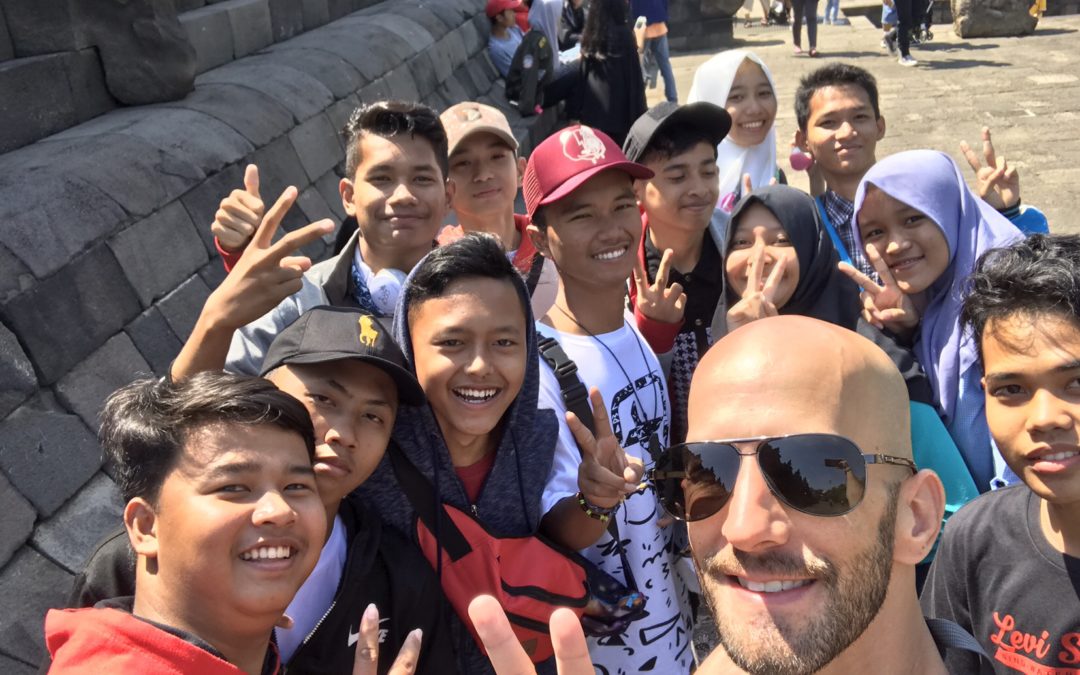With my suitcase all packed again, I got in my Grab and headed to the Jakarta, Indonesia airport for my flight back to Vietnam. I was a few hours away from ending my streak of nearly six months visiting countries that spoke Malay (Malaysia and Brunei) and its extremely close cousin, Indonesian (known to locals as “Bahasa”).
It quickly became apparent that my Grab driver didn’t know any English. How was I going to pass the time? I only knew a little Indonesian and this was Jakarta traffic, after all. In other words, as always, the traffic was horribly congested and we had an hour and 15 minutes ahead of us.
“Oh, I know! I’ll write down all the words I know in Malay and Indonesian!”
With that goal in mind, I got out my phone and quickly recalled all I could (hereafter, for simplicity, when I refer to “Malay”, I’m referring to Malay and Indonesian, unless otherwise noted).
Malay and Indonesian are easy to learn
So far, I’ve visited 12 non-native English-speaking countries. Save for my existing beginner’s level knowledge of Spanish, Malay has become my next strongest language. But why was it so easy to learn a few basic words?
For starters, similar to the aforementioned language of Spanish, Malay words are very easy to read and pronounce. Interestingly, I found out the word for “free” (i.e. “no cost”) is the same in Spanish as it is in Malay – “gratis”.
However, Malay is even easier than Spanish because, like English, their words don’t have any accents. Plus, in Malay, there are no verbs to conjugate! Wow, so refreshing!
Furthermore, when I spoke Malay to Malays, they almost always understood me. This was very encouraging and made me feel like learning more words.
The list
As you read through the list, you can see what words became most important for me to learn. The list may look long to some readers, but I can assure you, I feel the list is too short. I wish I’d kept a running list of words, rather than hurrying to remember them all on my way to the airport.
Note: All words are the same in Malay as they are in Indonesian, unless noted with an asterisk (*). Asterisks denote the Indonesian translation.
keluar = exit
masuk = entrance
berhenti = stop
awas = caution
selamat datang = welcome (when entering the next city, usually you’ll see a huge sign with this greeting)
sejuk = cold
panas = hot
tandas = toilet
ayam = chicken
daging = beef
nasi = rice
mee/mei* = noodles
goreng = fried
jam = hour
satu = one
dua = two
tiga = three (when taking pictures, “satu, dua, tiga!”)
sampai ketemu lagi = see you again/later (more common in Indonesia)
jumpa lagi = see you again/later (more common in Malaysia)
terima kasih = thank you
sama sama = you’re welcome
telur = egg
ikan = fish
kota = city/town
di = to
paket = combo (as in “combo meal”)
air = water (pronounced “ah-eer”)
air terjun = waterfall
selamat pagi = good morning
selamat malam = good night
besin = gasoline
minuman = drink
susu = milk
tidak = no
gula = sugar
pedas = spicy
roti = bread
wanita = women
pria = men
jalan = street/road
Musholla = Muslim prayer room
kloset = toilet
gratis = free
dilarang merokok = no smoking
gua = cave
bukit = hill
gunung = mountain
orang = people
The easy list!
Malaysia was a territory of the British Empire. This is partly why Malay has adopted a ton of words that are extremely similar – or in some cases, identical – to their English translations. Here’s a short list of examples:
ya = yes
bir = beer
Parkir = parking
sekolah = school
bas/bus* = bus
petrol = gasoline
terminal = terminal
komputer = computer
amerika = america
minit = minute
teksi = taxi
telefon = telephone
menu = menu
foto = photo
restoran = restaurant
sosej = suasage
tol = toll
informasi = information
internasional = international
plastik = plastic
organik = organic
teh = tea
kopi = coffee
es = ice
jus = juice
motor = motorcycle
tahu = tofu
polis = police
Safe travels
Now you know more about Malay and Indonesian. Remember to bring my list with you when you visit Malaysia, Brunei, Indonesia, or East Timor – you’ll be ahead of the game! Have fun!







